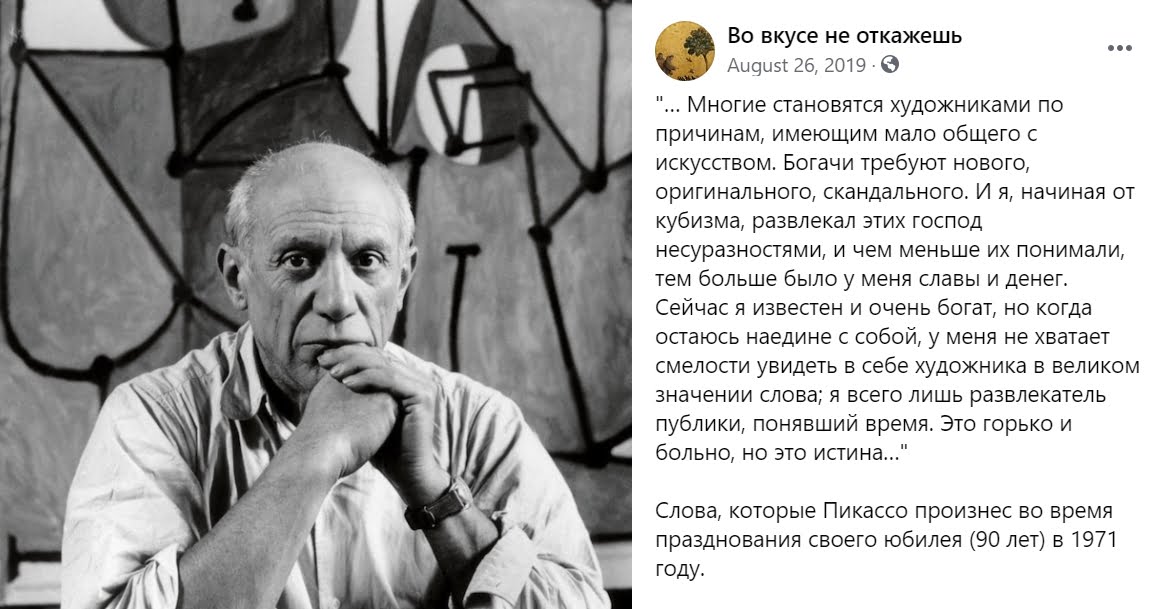In the Russian-language segment of social networks, you can often find a self-critical quote that the great Spanish artist allegedly said in his declining years. We checked to see if Picasso said this.
This is what the text, so popular on social networks, looks like: “Many people become artists for reasons that have little to do with art. The rich demand something new, original, scandalous. And I, starting from Cubism, entertained these gentlemen with absurdities, and the less they were understood, the more fame and money I had. Now I am famous and very rich, but when I am alone with myself, I do not have the courage to see myself as an artist in the great sense of the word; I'm just a public entertainer who understands the times. It's bitter and painful, but it's the truth..."
It is further indicated that Picasso said these words during the celebration of his anniversary (90 years) in 1971.
The quote became especially popular on Facebook, where it regularly generates hundreds of reposts. It is also found in other social networks, as well as on various art portals. Historian Anatoly Levandovsky included it in his preface to the book by Jean-Paul Crespel “Daily life in Montparnasse during a great era. 1905–1930.".
By the time of his 90th birthday, the artist and sculptor Pablo Picasso was not just a living legend - his fame and authority could be the envy of kings and presidents, singers and actors. At the same time, the genius continued to actively create, which even more attracted public attention to his figure. And to the significant date (October 25, 1971), which, as many realized, could turn out to be the last anniversary in the life of the master, artists and art critics all over the world prepared exhibitions, television and radio programs, as well as books about the famous Spaniard. One of the largest exhibitions opened in the Louvre and coincided with visit USSR Secretary General Leonid Ilyich Brezhnev to France. If you believe The Daily TelegraphWhen the Soviet leader was asked to share his fresh impressions of Picasso’s creations, Brezhnev replied: “He successfully came up with the idea of using a dove as a symbol of peace.”
But Pablo Picasso himself did not see any of this. The artist spent the last 12 years of his life in a villa in the town of Mougins on the Cote d'Azur in the company of his second official wife, Jacqueline Roque. According to publication in The New York Times, residents of the neighboring town of Vallauris, where he also managed to live at one time, organized a festive party on October 25, to which they were going to invite the hero of the occasion. However, Picasso really did not like reminders of his age, and therefore he had previously spoken negatively about the celebrations on the occasion of his 80th and 85th birthdays. The same thing happened now. Picasso closed the shutters throughout the house, ordered workers to tell guests that he was traveling, and completely ignored his own birthday. Even a delegation from the French Communist Party, dear to Picasso’s heart, including the famous writer Louis Aragon, after three days of unsuccessful attempts to get into the artist’s house, went to Paris. Dozens of paparazzi were left with nothing, pointing their cameras towards the villa in anticipation of the treasured silhouette. Thus, Pablo Picasso did not make any speeches in those days and, apparently, did not give interviews.
Where did Picasso's self-deprecating quote come from then? Perhaps he said it earlier? Indeed, if it began to be published in Russian (at least in this translation) relatively recently, in the West the recognition of the artist appeared in the press long before 1971. For example, in article In The Washington Post on August 3, 1952, journalist Sterling North wrote: “Paris newspapers are excited. The story was picked up by several American publications, including Quick. Describing himself as an "entertainer of the public" who exploited as much as possible the "stupidity, vanity and greed" of his contemporaries, Picasso recently admitted that he simply sought to please the masters and critics with "new, strange, original, extravagant, scandalous [works] ... the less they understood them, the more they admired me."
In subsequent years, other quotes from the sensational interview appeared in a number of art publications. And in December 1968, the famous American magazine Life dedicated Picasso double number, placing there, among other things, a short confession of the master: “When I am left alone with myself, I do not have the courage to think of myself as an artist in the great and ancient sense of the word. Giotto, Titian, Rembrandt were great painters. I am just a public entertainer who understood my time and made the best possible use of the stupidity, vanity, and greed of my contemporaries. My confession is bitter, more painful than it might seem, but its merit is that it is sincere.”
However, the above quote contrasts somewhat with the impression that can be formed from some other interviews with Picasso. The Spaniard has never shown himself to be a particularly modest person. In particular, knownthat when the surrealist poet Paul Eluard said about him: “He writes like God or the devil,” Picasso chose the first option: “I am God.” The confessional interview does not fit into this image. And not by chance, because it is completely fictional.
Back in 1931, the famous Italian writer, poet and literary critic Giovanni Papini created the satirical novel "Gog". Its title character keeps a diary, which consists of interviews with many famous personalities of his time. Many years later, in 1951, the already paralyzed and blind Papini wrote a continuation of his short story entitled "Black Book." Gog's new diary". Among the heroes were Hitler, Marconi, Dali, Picasso and other celebrities. And although the Italian did not want to mislead anyone, his book was analyzed into quotes by the most serious experts. Thus, one of the statements of pseudo-Freud ended up in an essay entitled "Unknown Freud", published in 1993. A similar fate awaited Gog’s fictitious interview with Pablo Picasso. The very next year, 1952, his translation was reprinted in Parisian newspapers, after which the above-mentioned article appeared in The Washington Post. Four years later, Papini died, but his legacy continued to live on independently. After the editors of Life magazine learned of a curious mistake made by its journalists, in January 1969 it appeared refutation, which included the origin story of the quote.

However, it was already too late. The quote continued to conquer the world and even now, in the digital age, excites the minds of numerous social network users. It is unknown who first decided to tie it to the 90th anniversary of Pablo Picasso, but the fact remains: it belongs to the pen of the Italian writer of the first half of the 20th century, Giovanni Papini.
Incorrect quote attribution
Read on topic:
1. Picasso Ignores Party For His 90th Birthday
2. I Am Only a Public Entertainer Who Has Understood His Times
If you find a spelling or grammatical error, please let us know by highlighting the error text and clicking Ctrl+Enter.






